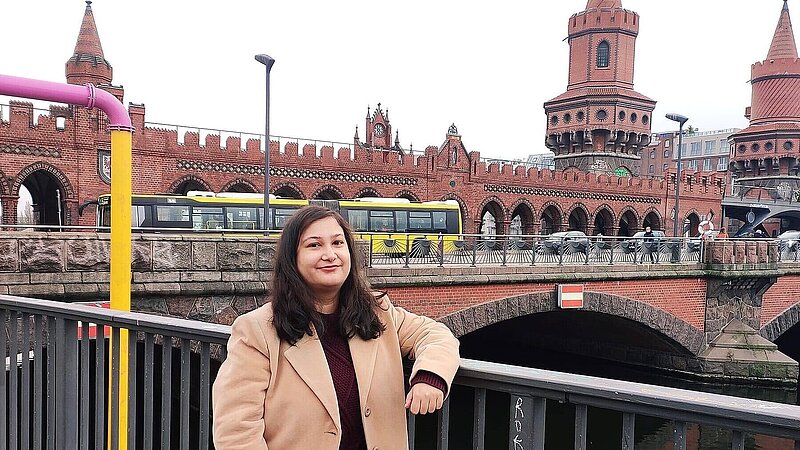
Get to know first-year MPP student and Indo-German Young Leaders Forum scholar Ankita Goswami.
Ankita Goswami comes from the small town of Digboi in the hills of Assam, Northeast India. She graduated with a law degree from National Law University, Odisha in 2017 and worked as a human rights lawyer for three years. She is an avid reader and has a bookstagram page. She is also a pop-culture buff (with a blog where she writes about regional movies), and spends a lot of time trying to play her favourite 80s rock songs on her acoustic guitar. Check out a short interview with Ankita below.
What were you doing before starting your studies in the fall?
Before coming to Hertie, I was working as a Programme Analyst at the Delhi office of a London-based NGO called iProbono. There, I worked on our trial court litigations on child sexual abuse and supervised the organisation’s legal aid work in other jurisdictions. I also published multiple factsheets on gender rights, helped organise several training sessions for lawyers and paralegals, and conducted informal community sessions in remote areas of Northeast India to educate people about their legal rights.
Why did you choose the MPP programme?
While I was working, I could identify several gaps in India’s child protection laws, women’s rights laws and citizenship policies. For example, marital rape is still legal in India, child sexual abuse laws are designed in a manner that inadvertently leads to delays in ensuring justice, and the country currently does not have a formal refugee protection law or laws regarding protection of stateless people. I want to address these gaps in existing laws and policies in the near future, starting by pursuing a master’s degree in public policy. My personal and professional experiences have made me realise that I can make a substantial difference, individually, only at the policy level.
I want to channel my aptitude and passion for human rights advocacy towards the field of public policy to ensure that government policies benefit the nation without compromising on the rights of its people. I believe that without ensuring individual freedom and liberty, holistic development of a country is not possible. Pursuing an MPP from a renowned policy school like Hertie, for me, is the first step towards gaining more knowledge and credibility in the field of public policy. The intellectual stimulation and cross-cultural exchange at Hertie was also something I looked forward to.
Which MPP concentration will you choose and why?
I chose the Management and Organisation concentration because it aligns with my interests and goals, which are studying different policy ideas or existing policies and identifying what the best method of implementation would be in a particular national, social or cultural context. It would also allow me to make the best use of my background as a law graduate. Law school and my work experience sharpened my critical thinking, research and drafting skills, and positive feedback on my policy memos in my first semester at Hertie helped confirm that my strength lies in this area.
What motivates you about Indo-German relations, and in what ways do you plan to pursue these interests during your master’s – and afterwards?
Germany is one of India’s most important trading partners in the world. The leadership of both the countries generally meet every two years to discuss collaboration on technological innovation, defence, health and the environment, which makes Germany an extremely crucial partner for India in Europe. Many Indian students and engineers also come to Germany every year for education and/or for work. On the other hand, German organisations like GIZ collaborate with the Indian government on many projects in India ranging from those aiming to conserve the country’s biodiversity to promoting women entrepreneurs by supporting women-run micro, small and medium-sized enterprises (MSMEs). Germany and India are also part of the G4, along with Japan and Brazil, working to reform and become permanent members of the UN Security Council. Therefore, I believe, developing a more consistent and friendlier relationship between the two countries is absolutely necessary. There is a lot that India can learn from one of the largest and most stable economies in the world, which has also emerged as a safe haven for refugees and asylum seekers from across the globe.
What exciting activities are you taking part in with the Indo-German Young Leaders Forum?
My first activity with IGYLF would be the IGYLF @ Home session in mid-January 2021 on ‘Scholarships in Higher Education in Germany’ for students who are applying to Hertie and for the IGYLF Scholarship. I will also be writing/co-writing white papers on important topics concerning Indo-German relations. When the COVID situation improves, I will be a part of the annual IGYLF conference which would provide me with an exciting and unique opportunity to gain a deeper understanding of the bilateral relationship between the two countries, and meet smart and like-minded delegates to deliberate on the topic of innovation, immigration, women empowerment and other pressing issues that are important to both India and Germany.
What has been the best part of Berlin so far, and do you have any favourite spots in the city already?
Well, I reached Berlin on 1st November 2020, and from the very next day I, along with every other person in the country, was supposed to stay in (and Netflix and eat maybe?) for a period of time that hasn’t come to an end yet. My most frequented place in Berlin so far is the Rewe next to my apartment building, and I guess my favourite spot in the city for now is ……… the study table in my apartment?
Applications for the Indo-German Young Leaders Forum Scholarship close on 1 February. The scholarship provides a full tuition waiver for the MPP, MIA or MDS programme. Apply today!
